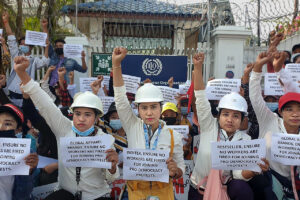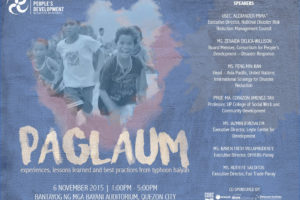PRESS RELEASE
June 30, 2020 – With the 44th Regular Session of the UN Human Rights Council (UNHRC), IBON International, a Philippines-based international NGO working on issues of people’s rights and democracy, joins other civil society organizations at the UNHRC in calling to adopt the recent UN report on human rights in the Philippines and to implement the report’s recommendations.
IBON International had six delegates join the UNHRC session virtually, led by Beverly Longid, a member of the IBON International Board of Trustees, and Amy Padilla, the organization’s Executive Director.
“With the recent UN report, we join the international calls for accountability, and for the immediate need to end the murderous ‘war on drugs,’ to junk repressive ‘national security’ policies such as the Executive Order 70 as well as the Anti-Terror Bill—as major threats to peoples’ civil-political rights in the Philippines,” Padilla said.
Longid voiced the organization’s support for the adoption of the report and for the recent joint statement of 31 UN Special Rapporteurs calling for a probe on rights violations in the country.
The session will be held in Geneva from June 30 to July 20, where the UN High Commissioner for Human Rights will present its report on the Philippines, and where the delegates will vote whether to adopt its findings and recommendations. Released last June 4, the said report documents rights violations in the Philippines from the “war on drugs,” the negative impacts of national security laws on civic space, and the situation of internally-displaced people, farmers, and Indigenous Peoples.
For Longid, the “continuing rights abuses amid the pandemic” just days before the UNHRC session are more reasons to implement the report’s recommendations. “The government tags civil society organizations as terrorists or communist sympathizers thus, a ‘threat’ to national security. As a human rights and Indigenous Peoples rights activist, I myself have been vilified. A week ago, the Police Regional Office Cordillera through a press release and video associated me with the revolutionary New People’s Army,” Longid said, referring to incidents this June that maliciously tag her and fellow Indigenous rights defenders from the Cordillera Peoples Alliance.
Longid is currently the Coordinator of the International Indigenous Peoples’ Movement for Self-Determination and Liberation. In 2018, Longid was also among the more than 600activistsand Indigenous rights defenders included in a Department of Justice (DOJ) petition before the Manila Trial Court that attempted to tag the New People’s Army as a terrorist group. Many names in the proscription, which also tagged the former UN Special Rapporteur for the rights of Indigenous Peoples Victoria Tauli-Corpuz, were eventually dropped after outcry from rights organizations and the international community.
Longid also highlighted that just days before, “new cases of violations emerged” against grassroots activists and communities“red-tagged” by state actors. She mentioned the June 20 Northern Samar case where strafing of a student activist’s house led to the deaths of two individuals and the wounding of two others, and the continuing state threats of closure of Indigenous Lumad schools in Mindanao amid “counterinsurgency” operations.
Longid also criticized the Philippine government’s pandemic response. “The government’s impotent COVID-19 ‘community quarantine’ only served to consolidate the president’s militarist regime. State forces had free rein to arbitrarily arrest people over ‘lockdown violations’ and even stopped community-based humanitarian initiatives,” she said.
Longid echoed the calls of civil society delegates to the 44th session of the UNHRC to adopt the report, and called for the Commission to “assign a special rapporteur on the Philippines to ensure the implementation of the report’s recommendations” as an institutional mechanism to put the recommendations into action.
Meanwhile, Padilla also commented on the implications of the current repressive climate in the Philippines: “The widespread attacks on civil-political rights, from the state-sanctioned killings in the false ‘drug war’ and ‘counterinsurgency,’ and now with the iron-fisted terror bill, hamper the possibilities for people’s substantive participation, even leadership, in governance and development.”
“We urge international actors to strengthen work with Philippine people’s organizations and civil society,” Padilla said. “They know the realities on the ground; their collective cries have played and will continue to play primary roles in the quest for justice. Working with them is also needed given many instances where governments, such as the current Philippine government, obstruct efforts to conduct UN inquiries and have rejected findings. International measures are just one road for accountability if the Philippine government continues with the prevailing impunity in the country today,” she added.
Organizations such as the International Coalition for Human Rights in the Philippines have long been calling for an impartial and independent probe on rights violations in the Philippines, and are also appealing to the Philippine government to accept the recent UN report’s findings and recommendations.###


